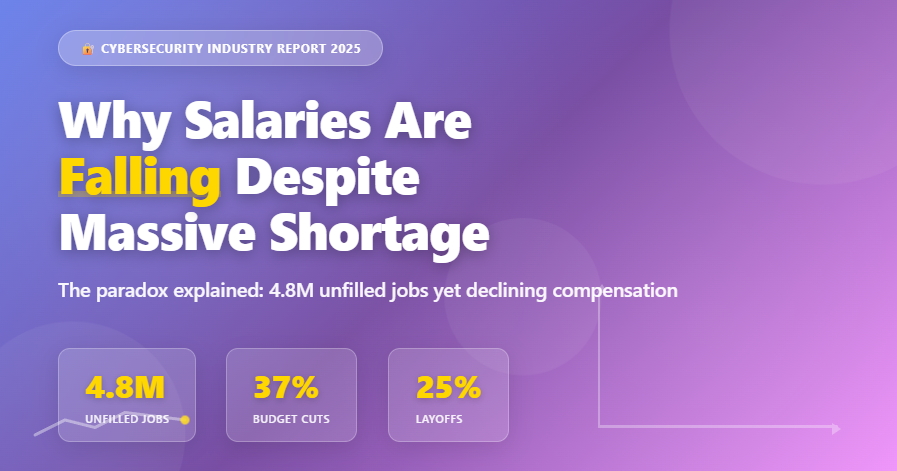Why Cybersecurity Salaries Are Falling Despite a Massive Shortage : The Economic Reality Behind the Skills Gap

According to recent industry data, 37% of organizations reported budget cuts in their cybersecurity functions in 2024, while 25% conducted layoffs of cybersecurity staff. Yet simultaneously, 4.8 million cybersecurity jobs remain vacant globally in 2025, creating one of the most perplexing paradoxes in the technology sector. The question keeps security professionals and career planners awake at night – if there’s such a massive shortage of cybersecurity talent, why are salaries on average falling year over year instead of skyrocketing?
The answer reveals a complex interplay of economic pressures, technological disruption, and fundamental shifts in how organizations approach security staffing.
The Cybersecurity Salary Paradox – What the Numbers Show

Generalized cybersecurity roles such as administrators and specialists have seen salary bands level off compared to 2024, with cybersecurity administrators now topping out around $130,000 with minimal year-over-year growth. This stagnation stands in stark contrast to specialized roles, where experienced product security engineers can earn up to $250,000 annually.
The disconnect becomes clearer when examining the data. Average salaries for cybersecurity jobs increased 4% from $119,860 in 2022 to $124,740 in 2023, but this modest growth masks deeper market disruptions happening beneath the surface.
Budget Cuts Drive Talent Shortage More Than Skills Gap
In 2024, 25% of respondents reported layoffs in their cybersecurity departments – a 3% rise from 2023 – while 37% faced budget cuts, a 7% rise from 2023. This represents a fundamental shift in what’s driving the cybersecurity workforce crisis.

The primary cause has shifted from a shortage of qualified candidates to economic pressure, leading to budget cuts, hiring freezes, and layoffs in security departments. Organizations aren’t failing to find talent – they’re choosing not to hire it.
The financial reality is stark. Nearly 40% of respondents experienced hiring freezes, and 32% have seen fewer promotions. When companies face economic uncertainty, security budgets become vulnerable despite mounting cyber threats.
How Automation and AI Are Reshaping Cybersecurity Compensation
The rise of artificial intelligence and automation tools has fundamentally altered the cybersecurity job market. The report attributes salary leveling to a mix of automation, outsourcing (both nearshore and farshore), and tighter corporate budgets.
Entry-Level and Generalist Roles Feel the Pressure
Traditional security analyst and administrator positions increasingly compete with automated solutions. Entry-level professionals are spending less time triaging minor alerts and more time learning how to work with automation platforms, write playbooks, and manage integrations.
Security orchestration, automation, and response platforms now handle tasks that previously required multiple full-time employees. Organizations deploying these tools can maintain security postures with smaller teams, directly impacting demand for entry and mid-level positions.
Specialized Roles Command Premium Compensation
Roles in cloud security, identity and access management, threat hunting, DevSecOps, and product security engineering continue to command top-tier compensation, with red teamers and threat hunters regularly crossing the $200,000 threshold.
The market increasingly rewards deep specialization over broad generalist knowledge. Professionals who can secure AI systems, implement zero-trust architectures, or lead complex incident responses maintain strong earning power. Those without specialized skills face downward salary pressure as their roles become commoditized or automated.

Understanding government agencies’ approaches to tracking VPN users provides valuable context for the specialized privacy and security knowledge that commands premium salaries.
Outsourcing and Geographic Arbitrage Impact Domestic Salaries
Organizations are turning to external providers for critical cybersecurity functions, with nearshore and farshore outsourcing becoming increasingly common. This trend particularly affects traditional cybersecurity roles that don’t require on-site presence.
The Economics of Global Talent Pools
Companies discovered during the pandemic that many security operations center functions can be performed remotely from anywhere in the world. Countries like India, Poland, and various Latin American nations offer deep cybersecurity expertise at significantly lower costs than North American or Western European rates.
The hard cost of salaries is obvious, but what is missing is the cost calculations of trust, transition, and thoroughness. Despite potential hidden costs, the immediate budget relief drives outsourcing decisions, putting downward pressure on domestic salary expectations.
Organizations maintain strategic security leadership in-house while outsourcing tactical operations like vulnerability scanning, patch management, and first-tier incident response. This bifurcation creates salary pressure on mid-tier roles that can be relocated.
Nearshore Advantages Drive Regional Competition
The time zone alignment and cultural compatibility of nearshore outsourcing to Latin America has made it particularly attractive for North American organizations. Companies can access skilled security professionals at 40-60% of domestic costs while maintaining easier collaboration than offshore arrangements provide.
For professionals interested in advanced security features that leading VPN providers offer, understanding these market dynamics helps contextualize salary expectations.
Skills Misalignment Creates Artificial Shortages
According to SANS/GIAC, 52% of leaders say the real deficit is not headcount but skill misalignment. Organizations report shortages while simultaneously struggling to fill open positions – a contradiction explained by examining what employers actually need versus what candidates offer.

The Experience Paradox
LinkedIn data showed that the number of new cybersecurity job postings year-over-year has been declining in many countries, including the United States, Singapore, and France. Companies post fewer entry-level positions while demanding extensive experience for remaining openings.
ISC2’s research found that 90 percent of cybersecurity professionals see skills shortages in their organizations, yet 90 percent of organizations have skills gaps within their security teams. The disconnect between available talent and organizational needs perpetuates the paradox.
Job descriptions often require unrealistic combinations of skills, certifications, and years of experience. This creates artificial barriers that reduce the apparent supply of qualified candidates, allowing organizations to justify lower compensation offers to applicants who don’t check every box.
What Employers Actually Want vs. What They Ask For
While cybersecurity professionals place significant emphasis on communication skills, cloud computing skills, AI, and governance risk and compliance, hiring managers prioritize those skills much less when hiring. Instead, they seek strong problem-solving skills, teamwork and collaboration, and professional curiosity, with technical skills ranking notably lower than candidates expect.
This fundamental mismatch means talented professionals with desired soft skills get overlooked because job postings emphasize technical certifications and specific tool experience. Meanwhile, organizations claim they cannot find qualified candidates.
Economic Pressures Override Security Priorities
Hosted/cloud services, telecommunications, and aerospace were the top three industries affected by cybersecurity budget cuts, with 43% of hosted/cloud services organizations anticipating more cybersecurity cutbacks over the next 12 months.
Short-Term Financial Thinking Dominates
When faced with immediate financial pressures, executives often view cybersecurity as a cost center rather than risk management investment. According to layoffs.fyi, 366 tech companies had layoffs in 2024, with 107,370 employees losing their jobs. Security teams felt these cuts disproportionately.
The brutal reality is that organizations with significant skills gaps are almost twice as likely to suffer a material data breach, with breaches costing an average of $1.76 million more than at well-staffed companies. Yet this long-term risk calculation loses to immediate budget pressures.
Government Sector Sets Troubling Precedent
CISA is expected to slash up to 1,300 jobs through a combination of terminations and other incentives, sending shockwaves through the security community. When the federal agency responsible for protecting critical infrastructure cuts staff dramatically, it signals to private sector organizations that security spending can be reduced.
These government cuts affect the entire talent pipeline. Early career hires and probationary staff have been laid off in significant numbers, and once that expertise walks out the door, it doesn’t just return when funding does.
The Shift to Skills-Based Hiring Changes Compensation
CyberSN’s 2025 report emphasizes a shift toward skills-based hiring, noting that experience alone no longer guarantees higher pay. Organizations increasingly hire based on demonstrated capabilities rather than years of experience or credential collection.
Certifications Lose Premium Power
While certifications remain valuable, they no longer command the salary premiums they once did. A key finding revealed that 90% of respondents found earning a cybersecurity certification highly valuable for their career, yet this widespread adoption means certifications serve as baseline qualifications rather than differentiators.
The market now rewards practical skills demonstration over credential accumulation. Professionals who can show GitHub repositories, CTF competition results, or documented incident response work may command higher salaries than those with walls full of certifications but limited hands-on experience.
Experience Matters Less Than Adaptability
Thanks to the growing adoption of the Equal Pay Act and standardized role definitions, professionals performing similar functions are increasingly compensated equally regardless of tenure. This standardization removes the automatic salary growth that traditionally came with years of service.
Organizations value professionals who adapt quickly to new tools and threats over those with extensive experience in legacy systems. This shift particularly impacts mid-career professionals who built expertise in areas that automation or cloud migration have made less relevant.
For context on cybersecurity’s evolving landscape and the critical need for expertise, understanding these compensation shifts helps professionals plan career development strategically.

Real-World Impact – Burnout, Retention, and Career Satisfaction
Job satisfaction in cybersecurity is down 4 percent, with 66 percent still satisfied with their role, but this decline reflects mounting pressure on security teams doing more with less.
Women Bear Disproportionate Impact
Only 67% of women reported job satisfaction in 2024 compared with 82% in 2022, with 32% of women respondents noting they experienced layoffs in security, considerably higher than the 23% of male respondents who noted the same.
The gender disparity extends to budget impacts. 40% of women surveyed said they had to grapple with budget cuts compared with 36% of men surveyed, and 42% of women experienced hiring freezes versus 37% of men. These pressures compound the existing challenges of achieving gender parity in cybersecurity.
The Burnout Epidemic
Security cutbacks are not only hindering the growth of the cyber workforce but are having ripple effects that cause burnout, low morale, and damage productivity. When teams shrink but threat volumes grow, remaining staff face impossible workloads.
C-suite professionals in the cybersecurity industry are 34 percent more likely than average respondents to say they currently want to quit their jobs. Even senior leaders feel the strain of defending organizations with inadequate resources.
Specialized Roles Buck the Downward Trend
Not all cybersecurity positions face salary pressure. Experienced product security engineers can earn up to $250,000 annually, while red teamers and threat hunters are now regularly crossing the $200,000 threshold.
Cloud Security Professionals Command Premium Pay
Organizations migrating to cloud infrastructure need specialists who understand AWS, Azure, and Google Cloud security architectures. These professionals remain in short supply relative to demand, maintaining strong compensation.
Identity and access management specialists also command premium salaries as organizations implement zero-trust architectures. The complexity of modern identity systems across hybrid and multi-cloud environments requires deep expertise that automation cannot yet replace.
Offensive Security Specialists Stay Valuable
Penetration testers, red teamers, and vulnerability researchers maintain strong earning potential. Penetration testers with skills in Kali Linux, Metasploit, and OSCP certification can expect competitive compensation as organizations recognize the value of identifying weaknesses before attackers do.
The adversarial testing mindset remains difficult to automate and requires creative thinking that AI tools cannot replicate. Organizations willing to pay premium rates for these specialists understand their value in preventing catastrophic breaches.
How AI Will Transform Rather Than Eliminate Jobs
According to Sam Hector, Senior Strategy Leader at IBM Security, AI will fundamentally shift the skills we require, with humans focusing more on strategy, analytics, and program improvements.
New Roles Emerge Around AI Security
Positions like Security Automation Engineer, AI Threat Intelligence Analyst, and Machine Learning Security Specialist are increasingly appearing on job boards. These roles often require understanding both traditional cybersecurity and data science or machine learning.
Organizations need professionals who can secure AI systems themselves – protecting models from adversarial attacks, ensuring training data integrity, and preventing model theft. This specialized knowledge commands strong compensation as AI adoption accelerates.
Human Judgment Remains Irreplaceable
AI will automate routine tasks but simultaneously elevate the demand for professionals who understand uniquely human skills. Strategic risk assessment, business context application, and ethical decision-making cannot be automated.
Security is rarely a binary decision and often involves negotiating trade-offs with the business, balancing risk mitigation with operational needs and strategic goals. These nuanced discussions require human judgment that technology enhances but cannot replace.
Geographic and Industry Variations in Compensation
Salary trends vary significantly by location and sector. Public sector industries, including military (16%), government (24%), and utilities (25%), expect lower rates of cybersecurity cutbacks in the future compared to private sector organizations.
Tech Hubs Maintain Premium Salaries
Major metropolitan areas like San Francisco, New York, Seattle, and Boston continue offering higher compensation to attract cybersecurity talent in competitive markets. However, the gap narrows as remote work allows organizations to hire from lower-cost regions.
Geographic arbitrage affects both directions – professionals in expensive cities face pressure from remote workers willing to accept lower salaries, while remote workers in low-cost areas can earn above their local market rates.
Financial Services and Healthcare Lead Compensation
Organizations in highly regulated industries handling sensitive data maintain stronger cybersecurity budgets. Banking, healthcare, and financial services typically offer above-average compensation to attract talent for compliance-heavy roles.
These sectors face regulatory penalties for breaches that make cybersecurity investment more defensible to boards and executives. The direct financial consequences create budget protection that other industries lack.
What This Means for Cybersecurity Professionals
The apparent paradox of falling salaries amid massive shortages reflects market realities professionals must navigate strategically.
Specialization Becomes Essential
Generalist security skills no longer guarantee strong compensation. Professionals must develop deep expertise in high-demand areas like cloud security, AI/ML security, DevSecOps, or threat intelligence.
According to recent workforce research, 52% of leaders say the shortage is not sheer numbers but the misalignment of skills. Closing personal skills gaps aligns with market demands and protects earning potential.
Continuous Learning Is Non-Negotiable
Employees aren’t keeping their skills up to date, creating vulnerabilities in their career trajectories. The rapid pace of technological change means that expertise gained two years ago may have limited relevance today.
Professionals who invest in learning emerging technologies, new attack vectors, and evolving defense strategies maintain competitive advantages. This includes hands-on practice with modern tools, participation in security communities, and staying current with threat intelligence.
Consider the Total Compensation Package
Base salary represents only part of total compensation. Benefits, stock options, remote work flexibility, professional development budgets, and work-life balance significantly impact overall value.
Organizations offering lower base salaries might provide better growth opportunities, cutting-edge projects, or work environments that reduce burnout. Evaluating roles holistically helps identify true career value beyond annual compensation figures.
Looking Ahead – The Future of Cybersecurity Compensation
Looking ahead to the next three years, cybersecurity professionals believe that Gen AI will help reduce the impact of staffing shortages and skills gaps. This technological assistance may stabilize the job market but will continue reshaping required skills.
Market Corrections and Stabilization
The current downward pressure on salaries may represent temporary market adjustment rather than permanent decline. Nearly 20% of respondents expect more cybersecurity layoffs in the next 12 months, suggesting continued turbulence before stabilization.
Economic recovery, increasing breach costs, and growing regulatory requirements will eventually force organizations to reinvest in security. Professionals who weather current challenges position themselves for strong opportunities when market conditions improve.
The Pendulum Will Swing Back
History shows that cybersecurity spending increases following major breaches or regulatory changes. The current cost-cutting phase will likely reverse when organizations face consequences of inadequate security.
Professionals maintaining skills and industry engagement during downturns emerge stronger when hiring accelerates. The fundamental need for cybersecurity expertise hasn’t diminished – only organizational willingness to pay for it has temporarily declined.
Key Takeaways for Career Planning
Understanding why cybersecurity salaries fall despite shortages helps professionals navigate this complex market:
Economic pressures override security priorities – Organizations choose short-term cost savings over long-term risk management, creating downward salary pressure despite acknowledged talent needs.
Automation reshapes but doesn’t eliminate roles – Entry-level and generalist positions face pressure while specialized roles requiring human judgment maintain strong compensation.
Skills misalignment drives artificial shortages – The gap between what employers claim to need and what they actually hire for creates market distortions affecting compensation.
Specialization commands premium pay – Deep expertise in cloud security, offensive security, AI/ML security, or DevSecOps protects earning potential against market pressures.
Geographic arbitrage affects everyone – Remote work and outsourcing create competition across borders, affecting compensation for roles that don’t require physical presence.

Conclusion
The paradox of falling cybersecurity salaries amid massive shortages resolves when examining underlying economic forces. Budget cuts, automation, outsourcing, and skills misalignment create market conditions where organizations report talent shortages while simultaneously reducing compensation and cutting positions. This contradiction reflects short-term financial thinking that prioritizes immediate cost savings over long-term security investment. For professionals, success requires strategic specialization, continuous learning, and understanding that current market challenges represent temporary disruption rather than permanent decline in the field’s value and necessity.
Frequently Asked Questions
Q: If there’s a 4.8 million cybersecurity worker shortage, why aren’t salaries increasing dramatically?
The shortage reflects unfilled positions organizations need, not positions they’re actively trying to fill. Budget constraints, automation, and outsourcing mean companies acknowledge gaps but choose not to hire domestic full-time staff. Economic pressures override security priorities, creating artificial supply restrictions that prevent traditional market dynamics from driving up wages.
Q: Which cybersecurity roles still command high salaries despite market pressures?
Specialized positions in cloud security, offensive security (penetration testing, red teaming), AI/ML security, DevSecOps, and product security engineering maintain strong compensation. These roles require deep expertise that automation cannot replace and remains in high demand. Experienced professionals in these areas regularly earn $200,000-$250,000+ annually.
Q: How can cybersecurity professionals protect their earning potential in this market?
Develop deep specialization in high-demand areas rather than remaining a generalist. Continuously update skills to stay current with emerging technologies and threats. Consider the total compensation package including benefits, growth opportunities, and work-life balance rather than focusing solely on base salary. Build demonstrated expertise through hands-on projects, competitions, and community contributions.
Q: Will AI and automation eliminate cybersecurity jobs entirely?
No, but AI will fundamentally transform roles by automating routine tasks and elevating demand for strategic thinking, business context application, and ethical judgment. New positions like AI Security Specialists, Machine Learning Security Engineers, and Security Automation Engineers are emerging. Professionals who adapt to work alongside AI tools rather than compete with them will thrive.
Q: Is the current downward salary pressure temporary or permanent?
Current trends likely represent temporary market adjustment rather than permanent decline. The fundamental need for cybersecurity expertise hasn’t diminished – organizations are simply choosing short-term cost savings over long-term security investment. Historical patterns suggest spending increases following major breaches or regulatory changes, creating opportunities for professionals who maintain skills during market downturns.
Loading newsletter form...






